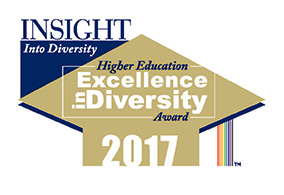Kansas State University honored for commitment to diversity
Tuesday, Jan. 16, 2018
MANHATTAN — Kansas State University has received the Higher Education Excellence in Diversity, or HEED, award for the fourth consecutive year from INSIGHT into Diversity magazine.
The HEED award is the only national recognition available for colleges and universities demonstrating an outstanding commitment to diversity and inclusion. Kansas State University is one of 80 universities or colleges to receive the distinction for 2017 and the only higher education institution in Kansas to receive the honor. Recipients were recognized in a recent issue of the magazine.
"This award underscores the university's commitment to the continual progress of our diversity and inclusion efforts," said April Mason, provost and senior vice president. "It is an honor to have our intentional and collaborative diversity efforts across the university recognized."
Schools are evaluated on all areas of diversity, including gender, race, ethnicity, socioeconomic status, veterans, people with disabilities and members of the LGBTQ community.
Project IMPACT is Kansas State University's flagship recruitment and retention program for multicultural students. Additionally, the university offers numerous student academic success programs such as McNair Scholars and Developing Scholars, as well as support services and diversity programs and events for the entire university community.
Kansas State University's commitment to diversity continues to grow and strengthen. The university recently hired Bryan Samuel as its first chief diversity and inclusion officer, a cabinet-level position. Adrian Rodriguez also has joined the university in the new position of associate vice president for student life for diversity and multicultural student affairs. The university has launched KSUnite. This call to action to reaffirm who K-Staters are, what we value and what we stand for as a university kicked off with a rally and facilitated conversations on Nov. 14, 2017. Ideas generated from these conversations will help guide the university community forward.

